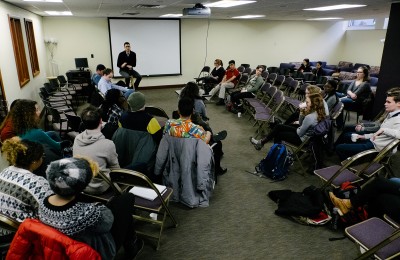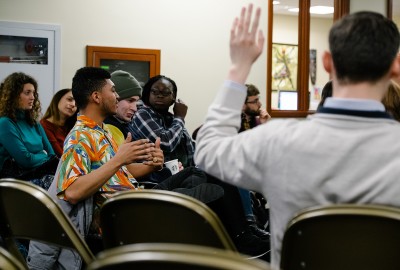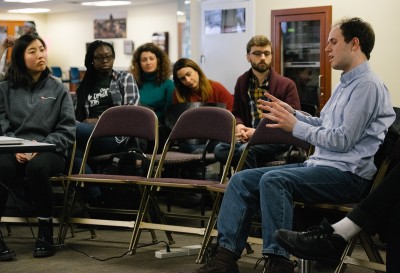
Boston University students conversed about U.S. foreign policy and the tackling of international matters under the Barack Obama administration during a “Coffee and Conversation” meeting held Friday afternoon.
Approximately 30 students attended the gathering at the Howard Thurman Center for Common Ground and sat in a circle to discuss how Obama has “made his impact on the rest of the world,” particularly in issues such as the Iran nuclear deal, ISIS and relations with China, Cuba and North Korea.
Pedro Falci, assistant director of the HTC, moderated the conversation by asking questions, and participants were free to respond and voice their opinion on the general theme of Obama’s foreign policy.
Danial Salman, a senior in the College of Arts and Sciences, said the majority of people who voted for Obama in 2008 had high expectations from him, and he sensed a setback from the high expectations.
“Obama’s foreign policy is trying to open its arms to the world, and I like to see that,” Salman said. “I like to see greater engagement. I think if this kind of attitude persists, we might see a better world and community, and that connects to the physical space [the HTC] we’re in right now.”
Prompted by Falci’s request, Salman “played devil’s advocate” and added that Obama could have prevented problems happening in the Middle East such as the Syrian refugee crises.

“Obama … not being heavy-handed in the Middle East has empowered other nations like Saudi Arabia and Iran to use their regional power to de-civilize the region,” Salman said. “Syria is Obama’s fault because he did not go intervene and stop this mess before it reached this point.”
Desmond Molloy, a freshman in the Sargent College of Health and Rehabilitation Sciences, said a lot of the people in the United States have the tendency to link an issue or a policy to a public figure.
“Other countries do look at … our leader as the view of the nation,” Desmond said during the conversation. “We see, with the United States, that a person has that much [of] an influence with the nation. I read somewhere that that kind of influence is a product of how much we matter in the world, by how large our economy is.”
Matthias Grenon, a junior in CAS, said there had been a “dramatic misrepresentation” during several presidential debates on issues in the Middle East, and that it would be almost impossible to create a political approach in four to eight years that would “revolutionize” the region’s current condition.
“The next U.S. president is not going to end the problem of terrorism in the Middle East,” Grenon said during the conversation. “It’s a historic dynamic that has its roots long before the candidates even breathed and [were] born.”
Falci then asked if the students thought Obama had underestimated the security and economic standing of countries such as Russia, Iran and China.
In response to Falci, Molloy said he was content with Obama having “the final say on what goes and what doesn’t,” and that he did not think Obama underestimates any country’s abilities.

“If you look at the Iranian nuclear deal, China — especially over territorial dispute in the South China sea — and the sanctions on Russia,” he added, “I think he has a pretty good sense of how much of a threat [the countries] do or do not pose.”
Several participants said the gathering encouraged them to learn more about the world and that it gave them a space to respectfully talk about pressing issues.
Svetlana Shapiro, a sophomore in CAS, said having the willingness to know more is crucial in building a better understanding of the world.
“If you want to be an open-minded person and if you want to be a critical person, then you need to be interested with what’s going on and to actually have to learn about it,” she said.
Issa Kenyatta, a senior in the College of Communication, said conversations like these help students gain better awareness of what happens internationally and emphasized the importance of listening to the community.
“We need to recognize that we live in a world that extends beyond our country’s borders,” he said. “The actions that our societies take always impact each other, and the only way to understand those consequences and to promote unity is for people to be informed about global events.”
Alex Li contributed to the reporting of this article.
A previous version of this story presented Danial Salman criticizing Obama’s foreign policy on the Middle East rather than solely responding to a prompt from the moderator. This correction is reflected in the story above.























































































































